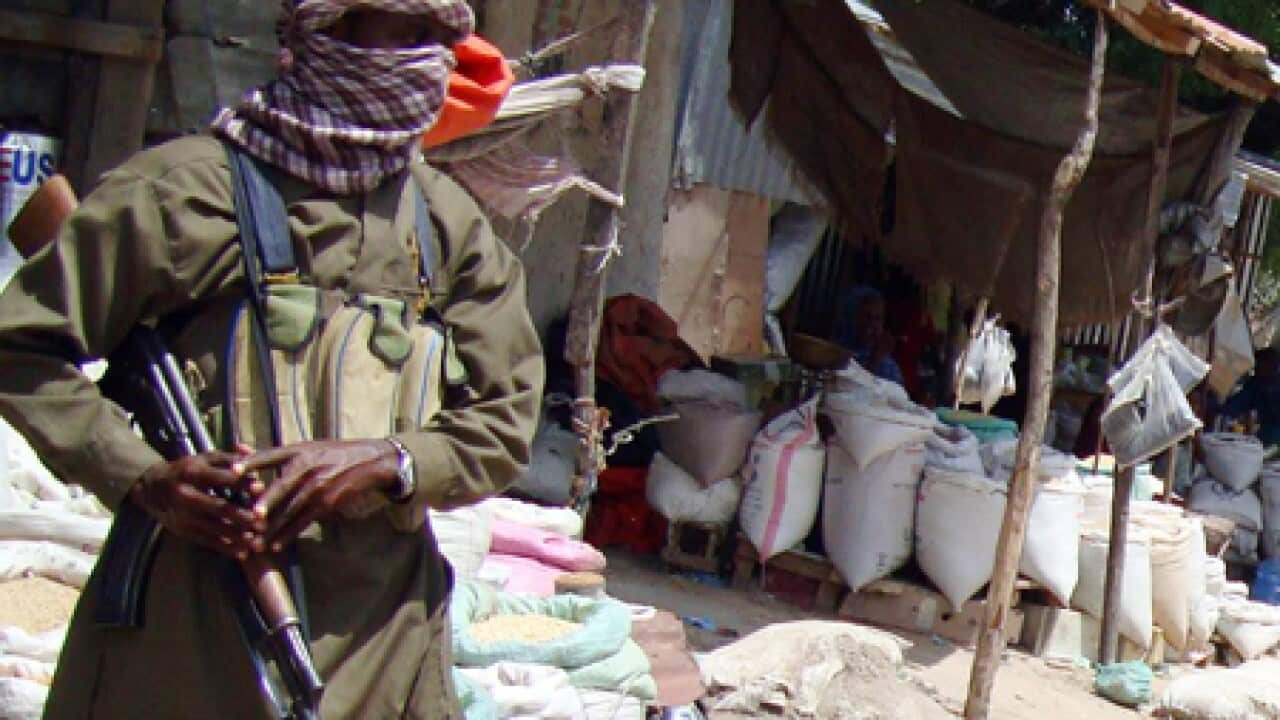WHAT IS AL-SHABAB?
Al-Shabab, which means "Youth" in Arabic, has taken control of large areas of south and central Somalia.
The group's main objectives include enacting Sharia law in Somalia, as well as waging 'jihad' on targets they deem to be 'enemies of Islam'.
The United States added al-Shabab to its list of foreign terrorist organisations in February 2008, after claiming the group had links with al Qaeda.
WHERE IS AL-SHABAB?
Al-Shabab won control of almost all of Somalia's capital, Mogadishu, in 2006. The Horn of Africa nation has been mired in anarchy since warlords toppled military dictator Mohamed Siad Barre in 1991.
Al-Shabab's hardline militia was part of the Somalia Islamic Courts Council movement that pushed US-backed warlords out of Mogadishu in June 2006 and ruled for six months before Somali and Ethiopian forces ousted them.
In August 2011, al-Shabab insurgents began pulling their fighters out of Mogadishu, raising hopes that humanitarian groups would be able to step up aid deliveries after years of blockages by the militant group.
Rejecting Somali President Sheikh Sharif Ahmed's claim to have quashed the insurgency, the militants' spokesman, Sheikh Ali Mohamud Rage, said their retreat was tactical only and they were holding their positions elsewhere in the country.
The retreat from Mogadishu did signal an acceptance it cannot militarily defeat a government propped up by foreign muscle and firepower, but raised the spectre of an escalation in al Qaeda-inspired raids.
HOW MANY FIGHTERS DOES IT HAVE?
There is not a clear figure, but al-Shabab is believed to command thousands of fighters including hundreds of foreigners.
Some of the insurgents' foreign fighters are from the Middle East with experience in the Iraq and Afghanistan conflicts. Others are young, raw recruits from Somali communities in the United States and Europe.
AL-QAIDA LINKS
Al-Shabab and al-Qaida in February 2012 announced their alliance, with al-Shabab leader Mukhtar Abu Zubair pledging allegiance to the global terror movement.
Al-Qaida's 2002 attacks on an Israeli-owned Kenyan resort in Mombasa and an attempted attack on a plane carrying Israeli tourists are believed to have been planned by an al-Qaida cell in Somalia.
US officials believe some of the al-Qaida terrorists who bombed the United States embassies in Kenya and Tanzania in 1998 were given refuge in Somalia.
WHAT'S THEIR IDEOLOGY?
Al-Shabab is inspired by the Saudi Arabian Wahabi version of Islam, though most Somalis belong to the more moderate Sufi strain.
While they initially won popularity with Somalis by promising security and stability after years of lawlessness and violence, al-Shabab's destruction of Sufi shrines has cost them much support among locals.
WHERE DOES AL-SHABAB'S MONEY COME FROM?
Before African troops moved in, al-Shabab was making a steady income from duties and fees levied at ports and airports as well as extorting taxes on domestic produce and demanding "jihadi" contributions.
Al-Shabab's only ally in Africa is Eritrea — which backs it to counter its enemy Ethiopia, which also has troops in Somalia. Eritrea denies charges that it helps arm al-Shabab.
AL-SHABAB THREATS AND ATTACKS
In July 2010, al-Shabab ramped up the regional security threat it has posed with a bomb attack on Kampala that killed 79 people while they were watching the soccer World Cup final. The strike, their first on foreign soil, was in revenge for Uganda's contribution to the 9,000-strong AU peacekeeping force AMISOM.
In September 2011, militants launched a new offensive on southern towns bordering Kenya and Ethiopia, prompting a swift reinforcement of the porous frontier by Kenyan troops. Somali government troops and allied militia groups regained control of a string of towns along the borders with Kenya and Ethiopia from al-Shabab rebel group earlier this year in a military offensive supported by both neighbors.
In September 2011, al-Shabab was blamed for the abductions of a British woman and a French woman from beach resorts in two separate incidents, dealing a major blow to Kenya's tourism industry.
In October 2011, al-Shabab was blamed for the kidnapping of two female Spanish aid workers from Kenya's crowded Dadaab refugee camp. The assault came a day after Kenya's Internal Security Minister George Saitoti branded al-Shabab fighters "the enemy" and vowed to attack them "wherever they will be".
On March 10, 2012, Kenya blamed al-Shabab for grenade attacks that killed at least six people at a Nairobi bus station.
In April 2012, Somali sports officials were among six people killed in an al-Shabab suicide bombing in Mogadishu.
On Sept 12, 2012, suicide bombers hit the Mogadishu hotel where newly elected President Hassan Sheikh Mohamud was , killing eight people. Mohamud was unhurt. Eight days later, suicide bombers killed at least 15 people in a restaurant.
In April 2013, al-Shabab militants killed at least 30 people in a wave of coordinated attacks in the Somali capital.
In July, the group claimed a car bomb attack on the Turkish mission in Mogadishu that killed three people. A Sept 7 attack on a packed restaurant killed at least 15 people.

